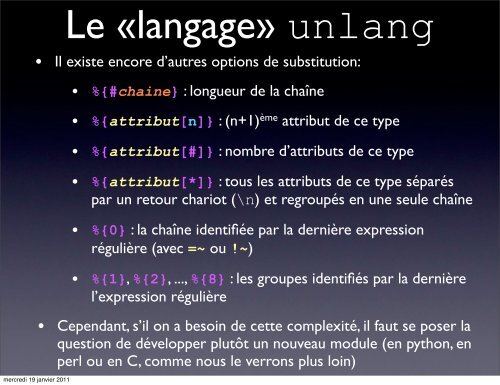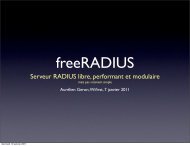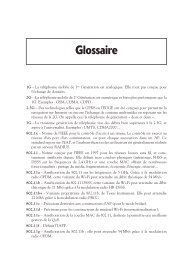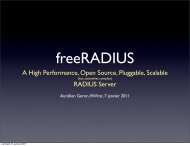Présentation de RADIUS, EAP et FreeRADIUS - 3ème partie
Présentation de RADIUS, EAP et FreeRADIUS - 3ème partie
Présentation de RADIUS, EAP et FreeRADIUS - 3ème partie
Create successful ePaper yourself
Turn your PDF publications into a flip-book with our unique Google optimized e-Paper software.
Le «langage» unlang<br />
• Il existe encore d’autres options <strong>de</strong> substitution:<br />
mercredi 19 janvier 2011<br />
• %{#chaine} : longueur <strong>de</strong> la chaîne<br />
• %{attribut[n]} : (n+1) ème attribut <strong>de</strong> ce type<br />
• %{attribut[#]} : nombre d’attributs <strong>de</strong> ce type<br />
• %{attribut[*]} : tous les attributs <strong>de</strong> ce type séparés<br />
par un r<strong>et</strong>our chariot (\n) <strong>et</strong> regroupés en une seule chaîne<br />
• %{0} : la chaîne i<strong>de</strong>ntifiée par la <strong>de</strong>rnière expression<br />
régulière (avec =~ ou !~)<br />
• %{1}, %{2}, ..., %{8} : les groupes i<strong>de</strong>ntifiés par la <strong>de</strong>rnière<br />
l’expression régulière<br />
• Cependant, s’il on a besoin <strong>de</strong> c<strong>et</strong>te complexité, il faut se poser la<br />
question <strong>de</strong> développer plutôt un nouveau module (en python, en<br />
perl ou en C, comme nous le verrons plus loin)






